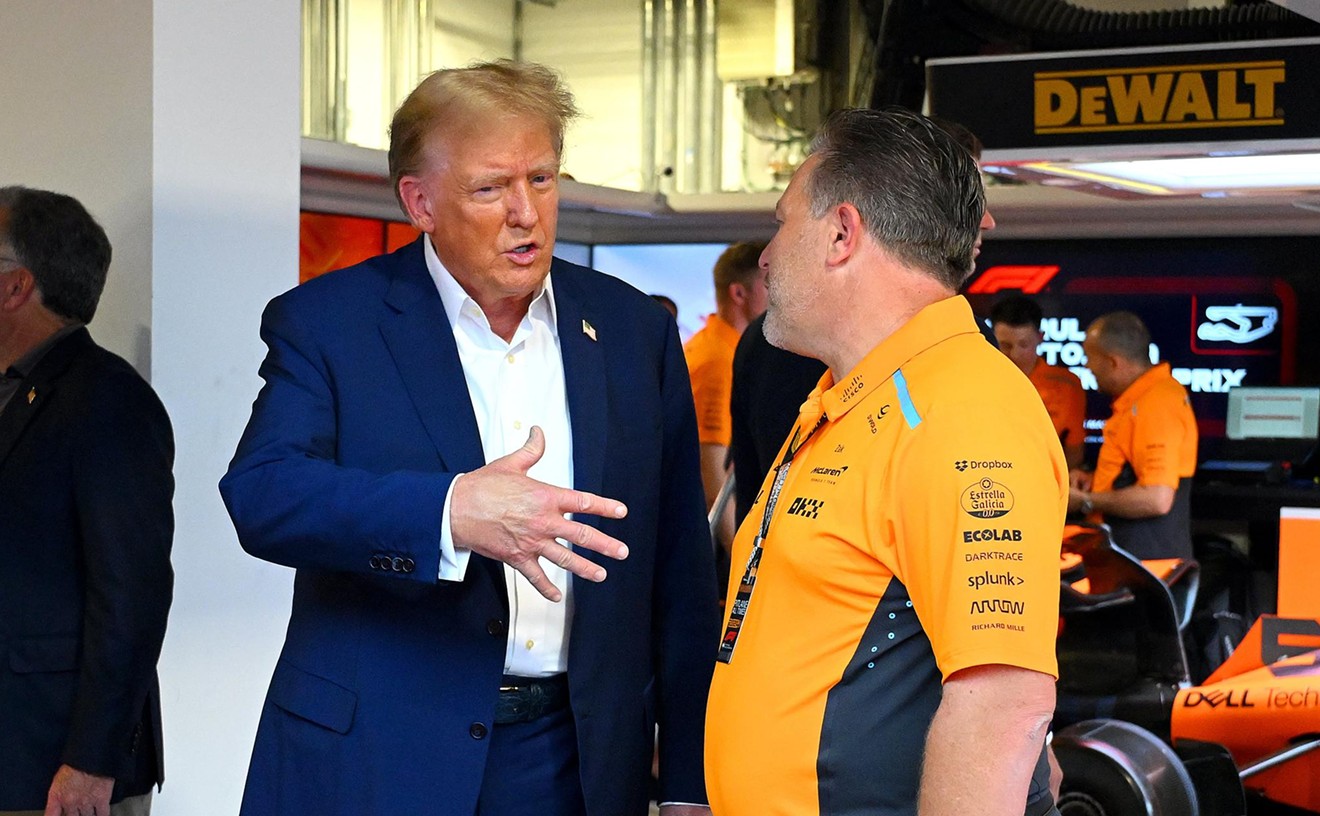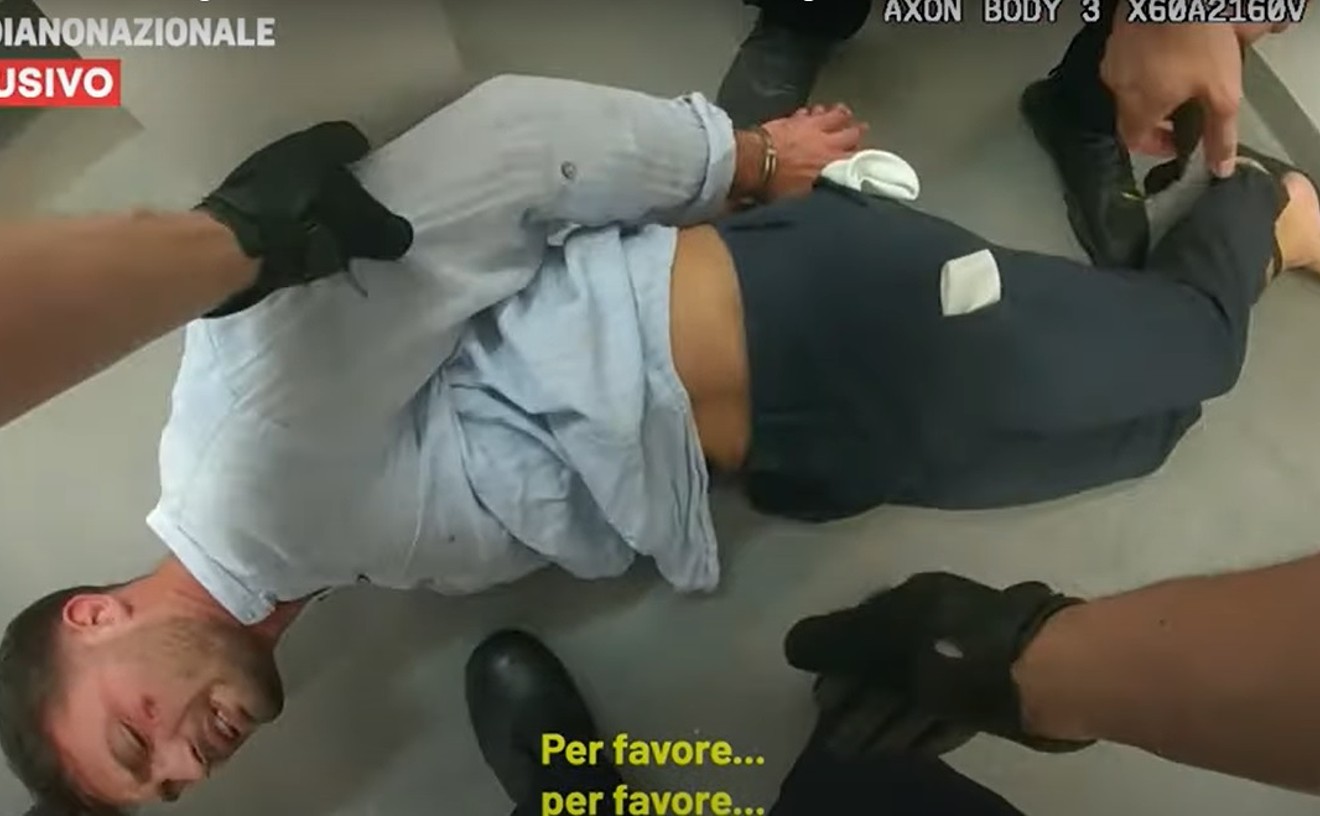"Look, any one of those stories could have a very innocuous explanation," Suarez patiently explains to Kulchur regarding the seemingly bizarre actions that drew national attention during his last brief mayoral tenure. "Was I quirky? Did I do some odd things? I'll tell you right now, yes. But everybody can find odd incidents in their lives."
Suarez would prefer to recall his earlier mayoral terms, running the city from 1985 to 1993, when he chose not to run for re-election and returned to his law practice. It was an administration that was comparatively uneventful, or at least as uneventful as any administration could be while Miami slid toward financial collapse and widespread poverty, held down one of the nation's highest murder rates, and was the site of semiannual race riots.
Most of all, though, Suarez would like to focus on the future: his hopeful return to politics as District 7's county commissioner representing Key Biscayne, Pinecrest, portions of Coral Gables, Brickell, and Coconut Grove, and a good-size chunk of Little Havana -- the seat being vacated by Jimmy Morales in his run for county mayor. "I just want to be one man out of thirteen," he stresses of his current bid to return to public office. "I'm not running for mayor."
Still those 111 days as mayor after the 1997 election are hard to forget. During that period, Suarez spent as much time making headlines with his personal behavior as with any of his policy initiatives. Sometimes his actions were puzzling: Faced with a $68 million budget deficit, Suarez simply declared that his own math showed no such shortfall. Sometimes his actions were weird: As Miami teetered on the edge of bankruptcy, Suarez flew up to Tallahassee to woo a state-appointed oversight board. His smooth negotiating strategy? Repeatedly call state Sen. John Ostalkiewicz "Senator Cabbage," refer to state Sen. Ron Silver as "Santa Claus," and when first introduced to Gov. Lawton Chiles, inquire about the governor's daughter's abortion as a conversational icebreaker. Sometimes, however, Suarez's actions were just plain bizarre.
After receiving an angry letter taking him to task for Miami's civic mess, Suarez decided a personal visit was in order. Hearing her doorbell ring late one December night, 68-year-old Edna Benson peered out the window of her Little Havana home to see a tall man, looking mad and brandishing a letter in one hand. Fortunately for Suarez, Benson recognized the figure as Hizzoner himself, and put down the loaded .38 pistol she kept for protection.
"What a lot of nerve showing up at that time of night, without the courtesy of a phone call," Benson later complained to the Los Angeles Times. "I said, & 'I'm not dressed, I'm on a long-distance call, and I don't have time to talk to you.' He went away. But really, I think this man is bouncing off the walls. " Based on Suarez's erratic track record, more than a few observers would have found Benson perfectly justified in firing off a warning shot.
Suarez remembers that evening a bit differently. In fact he sees those entire 111 days in a drastically different light than most people. The crying jags during press conferences, the rambling outbursts, his declarations of being a "prophet" set to lead Miami to a "utopia"?
"If the newspapers like you, they play all those things up as wonderful," he explains with a sigh. "I came to believe that Miami was not ready -- and it's still not ready -- for an Ed Koch, a Rudolph Giuliani, a Fiorello La Guardia," the larger-than-life mayors who came to define New York City over the years. "And I realized that too late. You cannot fight with people who buy ink by the barrel. You cannot have a confrontation with the Miami Herald or New Times. My overebullience, my effervescence just didn't work in Miami."
And that night in Little Havana with Edna Benson?
"Admittedly it was a little on the late side, but it was not intrusive, it was not confrontational," he insists. Rather, it was part of what made him the self-proclaimed "People's Mayor," someone who reveled in reaching out to "touch people." A doctor friend was visiting him with a brand-new convertible, he recalls, and the pair went out for a breezy drive on "one of those great nights in Miami in the fall." His friend was familiar with the address of the letter-writer, whose bitter tone had lingered in his head all day.
"We checked the house, the lights were on. I could see through the screen door, she didn't even have her front door closed. She had curlers on and her phone to her ear," he relates, back in the moment. "She kind of motioned to me, 'Come back tomorrow.' Turns out she was part of a Miami Herald focus group and she must have thought this was something worth calling a reporter and making a big deal over."
She almost shot you!
"I think that would say something about the lady, not the mayor," Suarez snaps. "I got a letter from a guy in Los Angeles saying, 'Gee, I wish my mayor would come visit me. I don't care if it is 10:15 p.m.'"
Suarez continues painstakingly running over the details of that night, one that has come to publicly define his career: He never saw a gun. Mrs. Benson didn't seem all that upset at the time. Did he mention her front door was open, practically inviting guests to stroll on in? Finally he stops short with what sounds like a breakthrough.
"I was too sensitive," he concludes. "I just didn't know how to defuse things. I didn't have the ability to go back the next day to see Mrs. Benson. I sent an aide -- I should have gone myself and had a photo opportunity."
Kulchur decides to seize the moment and play therapist. I'm having a hard time separating these two men, the Xavier Suarez of 1998 and the Xavier Suarez I'm talking to right now. I have to ask: Were you all right during those 111 days? Was there something going on in your personal life that left you a bit unbalanced?
"No! It was just the opposite!" he thunders, his moment of clarity instantly dispelled. "It was the enthusiasm of being able to run the city correctly, having executive powers, but being frustrated at not being able to govern! And having people question your every motive when you're trying to do good things!"
The Xavier Suarez of today definitely doesn't sound crazy. A little deluded? No doubt. But steering the conversation away from politics reveals the erudite Harvard law and Kennedy School of Government graduate who first impressed folks back in the Eighties.
Suarez is putting the final editing touches on his book, A Unified Theory of God, Mind & Matter, a sprawling treatise on, well, everything. In excerpts provided by Author House (the book's "self-publisher" -- not, they stress, a "vanity press," though if you mail them a check, they'll self-publish you too), Suarez breezily moves through discussions on metaphysics, the pros and cons of Darwinism, the existence of a higher being, and not least, why we're all here on this planet.
"I got started about ten years ago with Stephen Hawking's A Brief History of Time," he says. "It was mesmerizing to think that we're on the periphery of the expanding universe." Dan Brown's best-selling The Da Vinci Code served as a further impetus to attempt fusing religion with science, and if the results don't always cohere, they're no less fascinating for their intellectual twists and turns. Who knew the former mayor had been a budding philosopher this whole time?
"My interest was accelerated when I was thrown out of office in 1998," Suarez explains with a good-natured laugh. "One of the beneficial side effects was that I had a lot of time on my hands." Time, he adds, to see that "in the first half of the Twentieth Century, science explained everything. In the second half -- I'm borrowing from Jacques Barzun here -- it couldn't explain anything!"
If scientists can't even agree on why gravity exists, he continues, then don't expect them to understand the rise of fascism. Or how to enact economic theory. But it's here, just as Suarez is blaming a misunderstanding of "entropy" for many of Miami's ills, that he begins to get into trouble. He has plenty of novel ideas for county government, but somewhere in the journey from his brain to the outer world, matters get a little hazy.
Forget about an independent airport authority. Suarez wants to privatize the airport. And where has privatization been done? "Peru," he answers matter-of-factly. "There's a couple in Europe, I think. It's a growing trend!"
Likewise Suarez believes he's hit on a solution to the heated debate surrounding Miami-Dade's gay-rights ordinance, which Christian Coalition activists are once again gathering signatures to overturn. "Remember when President Clinton was elected, what he did with gays in the military? 'Don't ask, don't tell.'" Suarez is positively bursting to announce his own version for Miami's gay-rights ordinance: "Don't repeal, don't enact."
Yet when informed by Kulchur that "don't ask, don't tell" has been an unqualified disaster for all concerned -- record numbers of gay soldiers have been discharged, even Arabic linguists at a time when their translation skills are needed more than ever -- Suarez can only stammer back: "I really don't know about that."
To be fair, though, while Suarez's notions may be half-baked, the same can be said for much of the brain trust currently occupying the dais at the county commission chambers. Perhaps that's the reason Suarez's political resuscitation has been making some surprising headway.
Although dismissed by the local media as merely a punch line, Suarez has quietly been gathering funds and supporters. As of last week he'd raised $43,720 and had qualified for an additional $75,000 in public financing -- a campaign war chest of $118,720 that puts him on par with his county commission race's two "serious" candidates, former Miami City Manager Carlos Gimenez, who currently has $97,786 on hand, and well-connected attorney Andres Rivero, also set to receive public financing, bringing his available total to $163,730.
With five weeks until the August 31 election, none of these candidates appears to have a commanding lead (Hector Morales-George and inveterate New Times letter-writer Clyde Cates are also on the ballot). So can Suarez transcend his notorious reputation and actually win this race? Will voters forgive his late-night rambles, and particularly in light of South Florida's ongoing election difficulties, forget the vote fraud that threw him out of office?
Suarez is counting on it. While he insists he was unaware of the fraudulent absentee-ballot operation that elected him mayor, "nobody's going to mention '97 or '98 because [the problems with] this presidential election and the butterfly ballot is a much bigger deal." Equally important, he points to the example set by his mayoral successor, Joe Carollo. "Whatever anyone else might say about what I did that was a little odd, it certainly didn't rise to the level of throwing something at my wife," he quips.
You've got some campaign slogan there: Vote for me -- I may be nuts but I'm not as crazy as the other guy.
"No, no! Look, anybody can do a couple of odd things at some point in their life. I have done things, both as mayor and not as mayor, that are much odder than those [newspaper] stories."
That's hardly reassuring.
"I can go back to being cerebral. T.D. Allman called me the ultimate urban technocrat. I love my books, I can go back to being an introvert. "
So it's safe to drop Carl Hiaasen's "Mayor Loco" nickname for you and come up with a brand-new one?
"T.D. Allman's 'urban technocrat' is not bad," Suarez muses. "I'd like to think there's a little charisma to go with it." He pauses to roll some fresh monikers around his tongue. "How about calling me 'the People's Commissioner'? I always return phone calls. Maybe I visit people a little too late at night, but if you write me a letter, you're definitely going to get a response."










